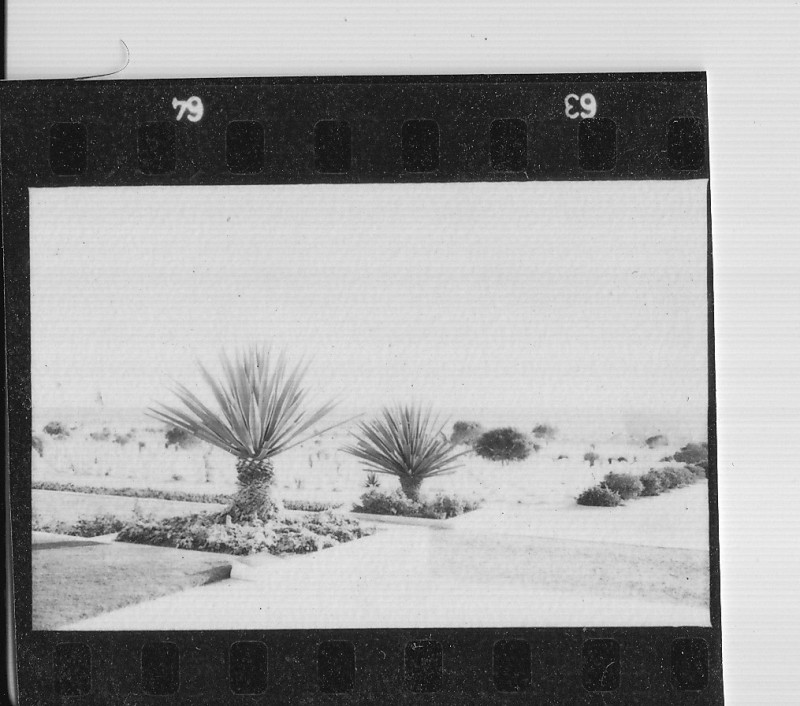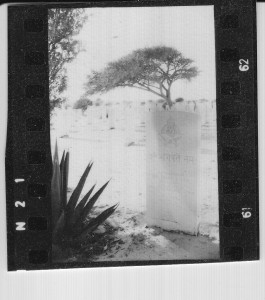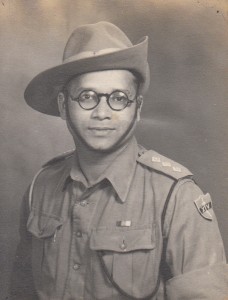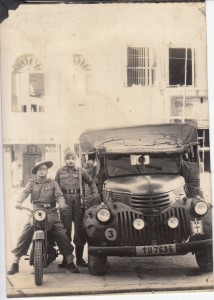As a child of the nineteen-fifties, I came of age at a time when the Second World War was still fresh in public memory. The war was everywhere: in the toys we played with, in our books and comics, and in the movies we were taken to see. The fact that my father
had fought in the war meant that it loomed especially large in my family.
My father had seen action in several theatres and had also served for a while as one of Lord Mountbatten’s ADCs.
Like many soldiers he was a wonderful story-teller and possessed a large fund of enthralling war stories.
We saw many war movies together, including Hum Dono, one of the few such made in Bombay (starring Dev Anand; a colorized version was recently re-released). But when I think back now it strikes me that some of the best of these war movies were actually prisoner-of-war movies: The Great Escape, Van Ryan’s Express and the unforgettable Bridge on the River Kwai.

My father’s life would might of course have taken a different turn if he had himself been captured. The thought of this was, I am sure, never far from his mind since many of his fellow-soldiers did, in fact, spend much of the war in captivity.
The North African theatre took an especially heavy toll on Indian regiments: from El Alamein in Egypt to Benghazi in Libya the desert sands are dotted with the headstones and graves of casualties from the subcontinent.

Thousands of Indian soldiers were also taken prisoner and moved to Italy. One such prisoner-of-war, whom my father might well have known, was Satyen Basu, a doctor from Calcutta who joined the Indian Medical Service (the army medical corps) early in the war and served with the Allied forces in Iraq, Syria and North Africa. His unit surrended to the Germans near Tobruk in 1942 and he was transported to a POW camp in southern Italy, not far from Naples. The smouldering cone of Vesuvius figures often in the memoir so my guess is that he was in the prisoner-of-war camp in Aversa, in the Campania region (for a full list of Italy’s World War II POW camps look here).
Many years after the war Dr. Basu wrote an account of his wartime experiences: A Doctor in the Army. The memoir was privately published in Calcutta in 1960. My father did not, so far as I know, read this book, but if he had I think he would have been blown flat aback by lines like these: ‘It was slowly revealed to me that this prison life was really not so bad as I at first apprehended. … When I spoke my mind to Lt. Y the Cavalry officer and asked him how he felt, he replied that it was in this prison that he had spent some of the best moments of his life. Never before, he declared, was he so free from worries and allowed to follow his own pursuits – books.’
Of course nothing in life is ever as one expects – but Dr. Basu’s account of his life as a POW seems almost unbelievable in an age in which captivity in conflict has come to be associated with hostages and beheadings on the one hand, and on the other with Guantanamo Bay and Abu Ghraib.
Over the next four days I will post a few pages from A Doctor in the Army. Dr. Basu’s words are transcribed here just as they were printed, without any editing or corrections.
__________________
from A Doctor in the Army, Satyen Basu, p. 139.
Lt. Y was one of the most intelligent young lads I had ever met. Born of a royal family in one of the Indian states his early education was in the R.I.M.C. He was thus earmarked for an army career. He had proved himself an able officer in the cavalry regiment that he was serving in. But I am sure his intellectual equipment was misplaced. At 22 he was a good portrait painter, and a connoisseur of music and the dance. In two months he had brushed up his knowledge of French which he could now speak fluently, and was well up in the German language. It seemed he normally agreed with Aristotle that intellectual attainment is the greatest pleasure of life, for he kept most of his time within his room reading some book or other. And yet he had a keen sense of humour. I got friendly with him in studying together a few lectures on psychology delivered by a professor in his former camp. But it was his amiable nature that made me his friend.
So it was now a purely Indian camp and Indian officers from other camps in Italy were gradually being brought into this camp. Things were steadily improving. What with the Red Cross food parcels and what with the fruits and vegetables we bought from the contractor at a heavy price, food was now adequate. And price was not the question when things are available. It certainly raises the question in readers’ mind as to where we got the money from. By international arrangement a prisoner of war gets paid by the enemy in their currency a sum equivalent to quarter of his pay. So we used to be paid that sum in coupon lire which were valid only inside the camp. It was a precaution against our possible attempt at bribing the civilians to manage our escape. The quarter of our pay is thus debited in our account by our Government as ‘enemy cut’. We also lose quarter of our pay for being a prisoner of war. Whether this loss of a quarter of one’s pay was meant to act as a deterent to a prospective prisoner, or whether the financial authorities cool their conscience by realising or whether the financial authorities cool their conscience by realising some money from people who do not work for the Government I still do not know. But one certainly does not gain financially as a prisoner of war. Nevertheless the payment made inside the prison made all the difference in our lives. It not only allowed us to pay for extra food to keep the wolf from the door and get the daily necessities like a razor blade or a tube of toothpaste, but it also permitted us to have occasionally a few luxuries like ice-cream or vino. The canteen was increasing its stock. In the days of the South Africans they had had fountain pens and tobacco pipes in the canteen. Now even a violin was available. The violin cost about Rs. 100 in Indian money. Now, I had never played the violin before, but I thought it would be a nice thing to start learning it in the prison just to kill time if for nothing else, particularly when there were a Gurkha V.C.O. and a Madrasi V.C.O. who were well up in music and eager to teach. The tragedy of it was that it killed other people’s time more than mine. It was not so with my German which I had by now started seriously to learn from a book, after being initiated into it by a brother officer.
__________
I am grateful to Dr Swapan Chakravorty and Shri Kalyan Mukherjee of the National Library in Kolkata for their help with locating this book.



Loved reading these 4 posts about Dr Basu’s life as PoW in Italy. Thanks 🙂
Thank you!
I am working on a novel about an Indian POW in Italy who escapes after the Italian surrender (as many British soldiers did) and tries to get back to the Allied lines – unlikely I know but anything can happen in fiction.
It is almost impossible to find any information about Indian POWs in Italy – or indeed elsewhere – or any first hand accounts of the fighting. is there any way I can get hold of this book or a facsimile of it?
Have just realised who you are! Of course you know all about fiction.
Hello Amitav,
I am writing a book about my Fathers experience in WW2, most of which he was held in captivity. I’m from Australia.
Do you have an email where I can contact you?
Please feel free to send an email to the email address above.
Thank you.
Kind Regards Chris